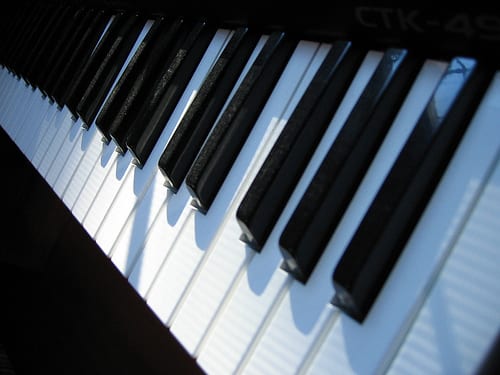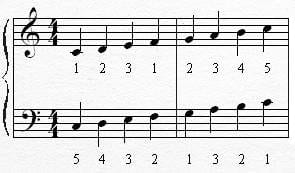 I like to see all beginning level piano students start practicing the major scales. There is a wealth of information hidden inside a scale! Knowledge of scales will help you to understand all of the major keys, along with where chords come from and how they are structured. Eventually it will enable you to understand the different types of minor keys and how they function. The melody of a song comes from the scales too. A melody is simply a scale that is rearranged to make a beautiful song or a beautiful work for piano.
I like to see all beginning level piano students start practicing the major scales. There is a wealth of information hidden inside a scale! Knowledge of scales will help you to understand all of the major keys, along with where chords come from and how they are structured. Eventually it will enable you to understand the different types of minor keys and how they function. The melody of a song comes from the scales too. A melody is simply a scale that is rearranged to make a beautiful song or a beautiful work for piano.
The way I present the scales is by explaining that they are actually in two families: the sharp family and the flat family. Each family has its own finger pattern, because of the way the scales are structured. Most of the flat keys contain many black keys and the student understands right away why a different approach is needed to master them. The sharp keys work a bit differently. As you are practicing, you will notice that some keys actually have a more beautiful sound quality than others. In your piano lessons, we’ll talk about this and discuss why it seems that so many pieces are written in D Flat major or C sharp minor, or A major, for example.
Scale study should never be a tedious chore. Five or ten minutes a day is plenty of time for a beginning student to practice the scales and work all their fingers to become proficient and strong and develop the dexterity they are seeking. The great composer and piano teacher Chopin said it best. In his opinion, practicing the scales should never be tedious. He believed that students would get all the technique they need when the practice many different pieces, such as etudes or a polonaise or a piano sonata.
Eventually the day will come when you will see the big picture – how it all fits together. You will look at a piece of music and instead of seeing what looks like a lot of separate notes, you will look at it and see the chord pattern, the melody, and the structure of the composition. At that moment, you will begin to feel very competent and in control. You are now on your way to becoming an excellent musician!
Always remember – the scales are the foundation of everything in music!
The C Major Scale (below) is nice a little exercise to get started. This scale does not have any sharps or flats, so you can focus on the finger pattern.

Janice S. teaches music performance and piano lessons with Wakefield, MA. She received her Bachelor’s degree in Music Education from Berklee College of Music, and her specialties include classical, show tunes, jazz, and popular music styles. Janice joined the TakeLessons team in Learn more about Janice, or search for a teacher near you!
Photo by bennylin0724
Suzy S.

